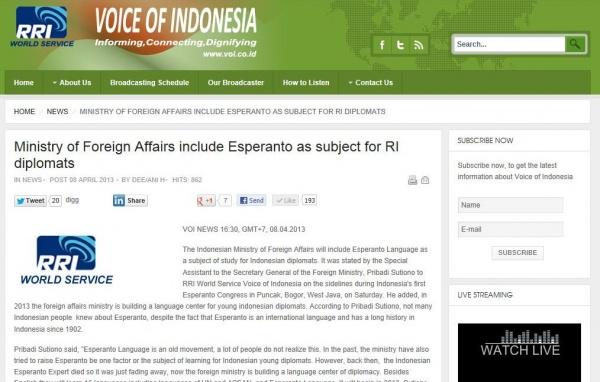Sinjoro Eng presents a case for Esperanto to the political coalitions of Malaysia.
I won’t participate in Bantah 505 because I look forward to GE 14. I did not apply for the BR1M because I am not a beggar even though I live from hand-to-mouth.
When many are still analysing the failure and success of GE13, I have already made up my mind on which party I am going to vote for.
My wish is simple: I would vote the party which introduces Esperanto in the education system. I would cast the vote to the coalition which will announce publicly that their service centres are providing Esperanto courses.
While most people are paying high tuition fees to learn English, I merely ask for a language unheard of by many in Malaysia, Esperanto. I do not represent the poor people in the country but only the members of my family.
I do believe that there are many poor families, as according to the data regarding BR1M, 80% of the people in Malaysia qualified for this scheme.
Esperanto is a cost-effective learning language and at the same time, many other benefits come with it.

Learning Esperanto requires 100 hours for English native speakers and 150 hours for others. Some children in my family are unable to complete Standard 6 and some are illiterate although they sat in a classroom for 11 years, leaving the school with a certificate without the knowledge to construct a complete sentence.
Please do not blame the English teachers in Malaysia. They are hard working educators despite lacking proficiency of the imperialist language. Can we change of the fact that 2/3 of our English teachers did not obtain their O Level credits? Can this be done within a year? The older generation keeps lamenting that the English language standard is not at par but they do not see the needs of students today. Let the English language lovers continue their love affairs with English, please, but do not torment the whole nation with your love.
Be realistic: if urban residents are facing problems, then the rural population would be even worse. I do not like my family members agonising over irregular verbs if they do not like English. They should be putting in more time learning the national language.
Read the data carefully before you jump to conclusions.
Learning Esperanto requires 150 hours, Malay 900 hours and English 2,000 hours. Even before the children can master the national language, children who learn Esperanto are already able to communicate with the people in the world.
While Esperanto may not be the best solution, at least it provides the opportunity for my family members and many others too, I believe, to travel and meet people in more than 130 countries in the world. The future of Esperanto trading partners in the IKEF is very interesting. They do not have to depend on the BR1M, and can instead stand proudly and compete with people worldwide.
English is dying off and will reincarnate into Panglish. I do not want my family members to be unable to read in the future. Those who claim to be native speakers of English, especially in Malaysia, please spend your time in protecting your mother tongue instead of critiquing the weakness of Esperanto.
If you agree that knowledge is power, you should know that Esperanto can empower the poor children of today to become the leaders of tomorrow. Give them an equal platform to learn.
It is time for both coalitions to ponder for this project. They have service centres throughout the country to provide such facilities for learning. They have the manpower to incorporate Esperanto as a medium of education, spreading the language into the fields, deep into jungles and across the seas.
Why blame rural voters when you are doing nothing for empowerment of knowledge for the poor?
You know well where the votes from my members of family will go.
I keep my fingers crossed.


Esperanto…hmmm sounds interesting. Perhaps our Education Minister care to input his thoughts (or taunts) in acceptable English on this revolutionary idea?
The Esperanto was recognised in 1954 and the representatives in UNESCO from Malaysia should have read tons of the information about Esperanto, but until now, they are pretending to see nothing and hear nothing.
The ministry still want to make the English paper a compulsory pass, as if they have no talents in the department to know that English is on the decline and even make MUET a pass to get more stress to the people.
Who will do it, will gain my vote despite Pakatan was soliciting addresses of the voters and sent in rubbish info. Who can read their high class English, especially the poor people who are not even to write their names properly.
I wrote an article about it for Pakatan, but they did not read between the lines.
Read here https://www.loyarburok.com/2011/11/24/pakatan-intr…